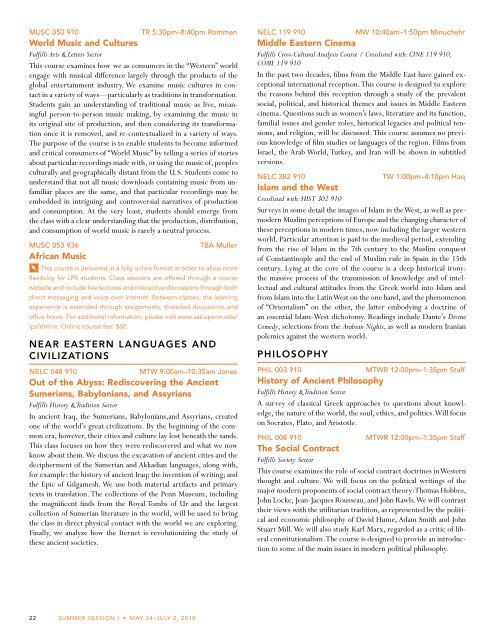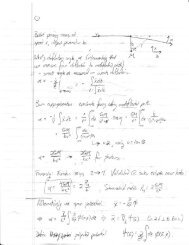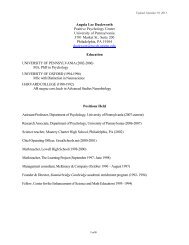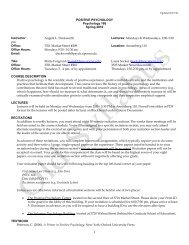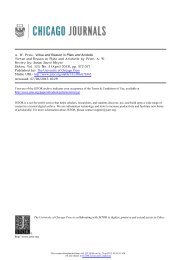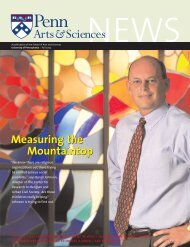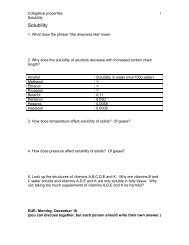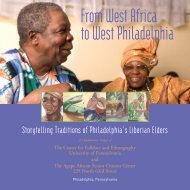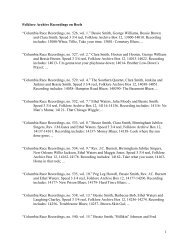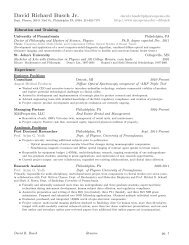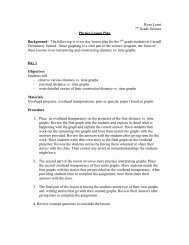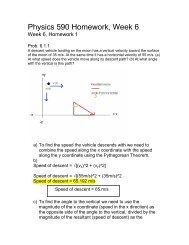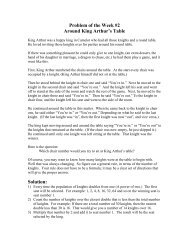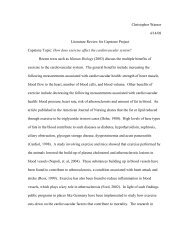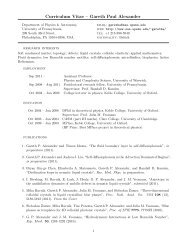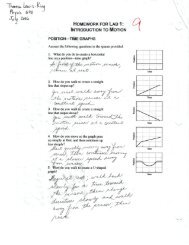PENN SUMMER - University of Pennsylvania
PENN SUMMER - University of Pennsylvania
PENN SUMMER - University of Pennsylvania
Create successful ePaper yourself
Turn your PDF publications into a flip-book with our unique Google optimized e-Paper software.
MusC 050 910 Tr 5:30pm–8:40pm rommen<br />
World Music and Cultures<br />
Fulfills Arts & Letters Sector<br />
This course examines how we as consumers in the “Western” world<br />
engage with musical difference largely through the products <strong>of</strong> the<br />
global entertainment industry. We examine music cultures in contact<br />
in a variety <strong>of</strong> ways—particularly as traditions in transformation.<br />
Students gain an understanding <strong>of</strong> traditional music as live, meaningful<br />
person-to-person music making, by examining the music in<br />
its original site <strong>of</strong> production, and then considering its transformation<br />
once it is removed, and re-contextualized in a variety <strong>of</strong> ways.<br />
The purpose <strong>of</strong> the course is to enable students to become informed<br />
and critical consumers <strong>of</strong> “World Music” by telling a series <strong>of</strong> stories<br />
about particular recordings made with, or using the music <strong>of</strong>, peoples<br />
culturally and geographically distant from the U.S. Students come to<br />
understand that not all music downloads containing music from unfamiliar<br />
places are the same, and that particular recordings may be<br />
embedded in intriguing and controversial narratives <strong>of</strong> production<br />
and consumption. At the very least, students should emerge from<br />
the class with a clear understanding that the production, distribution,<br />
and consumption <strong>of</strong> world music is rarely a neutral process.<br />
MusC 053 936 TBa Muller<br />
African Music<br />
This course is delivered in a fully online format in order to allow more<br />
flexibility for LPS students. Class sessions are <strong>of</strong>fered through a course<br />
website and include live lectures and interactive discussions through both<br />
direct messaging and voice over internet. Between classes, the learning<br />
experience is extended through assignments, threaded discussions and<br />
<strong>of</strong>fice hours. For additional information, please visit www.sas.upenn.edu/<br />
lps/online. Online course fee: $60.<br />
near eaSTern lanGUaGeS anD<br />
CiViliZaTionS<br />
nelC 048 910 MTW 9:00am–10:35am Jones<br />
Out <strong>of</strong> the Abyss: Rediscovering the Ancient<br />
Sumerians, Babylonians, and Assyrians<br />
Fulfills History & Tradition Sector<br />
In ancient Iraq, the Sumerians, Babylonians,and Assyrians, created<br />
one <strong>of</strong> the world’s great civilizations. By the beginning <strong>of</strong> the common<br />
era, however, their cities and culture lay lost beneath the sands.<br />
This class focuses on how they were rediscovered and what we now<br />
know about them. We discuss the excavation <strong>of</strong> ancient cities and the<br />
decipherment <strong>of</strong> the Sumerian and Akkadian languages, along with,<br />
for example: the history <strong>of</strong> ancient Iraq; the invention <strong>of</strong> writing; and<br />
the Epic <strong>of</strong> Gilgamesh. We use both material artifacts and primary<br />
texts in translation. The collections <strong>of</strong> the Penn Museum, including<br />
the magnificent finds from the Royal Tombs <strong>of</strong> Ur and the largest<br />
collection <strong>of</strong> Sumerian literature in the world, will be used to bring<br />
the class in direct physical contact with the world we are exploring.<br />
Finally, we analyze how the Iternet is revolutionizing the study <strong>of</strong><br />
these ancient societies.<br />
22 <strong>SUMMER</strong> SESSIOn I • MAY 24–JULY 2, 2010<br />
nelC 119 910 MW 10:40am–1:50pm Minuchehr<br />
Middle Eastern Cinema<br />
Fulfills Cross-Cultural Analysis Course / Crosslisted with: CINE 119 910,<br />
COML 119 910<br />
In the past two decades, films from the Middle East have gained exceptional<br />
international reception. This course is designed to explore<br />
the reasons behind this reception through a study <strong>of</strong> the prevalent<br />
social, political, and historical themes and issues in Middle Eastern<br />
cinema. Questions such as women’s laws, literature and its function,<br />
familial issues and gender roles, historical legacies and political tensions,<br />
and religion, will be discussed. This course assumes no previous<br />
knowledge <strong>of</strong> film studies or languages <strong>of</strong> the region. Films from<br />
Israel, the Arab World, Turkey, and Iran will be shown in subtitled<br />
versions.<br />
nelC 382 910 TW 1:00pm–4:10pm haq<br />
Islam and the West<br />
Crosslisted with: HIST 302 910<br />
Surveys in some detail the images <strong>of</strong> Islam in the West, as well as premodern<br />
Muslim perceptions <strong>of</strong> Europe and the changing character <strong>of</strong><br />
these perceptions in modern times, now including the larger western<br />
world. Particular attention is paid to the medieval period, extending<br />
from the rise <strong>of</strong> Islam in the 7th century to the Muslim conquest<br />
<strong>of</strong> Constantinople and the end <strong>of</strong> Muslim rule in Spain in the 15th<br />
century. Lying at the core <strong>of</strong> the course is a deep historical irony:<br />
the massive process <strong>of</strong> the transmission <strong>of</strong> knowledge and <strong>of</strong> intellectual<br />
and cultural attitudes from the Greek world into Islam and<br />
from Islam into the Latin West on the one hand, and the phenomenon<br />
<strong>of</strong> “Orientalism” on the other, the latter embodying a doctrine <strong>of</strong><br />
an essential Islam-West dichotomy. Readings include Dante’s Divine<br />
Comedy, selections from the Arabian Nights, as well as modern Iranian<br />
polemics against the western world.<br />
PhiloSoPhY<br />
PhIl 003 910 MTWr 12:00pm–1:35pm staff<br />
History <strong>of</strong> Ancient Philosophy<br />
Fulfills History & Tradition Sector<br />
A survey <strong>of</strong> classical Greek approaches to questions about knowledge,<br />
the nature <strong>of</strong> the world, the soul, ethics, and politics. Will focus<br />
on Socrates, Plato, and Aristotle.<br />
PhIl 008 910 MTWr 12:00pm–1:35pm staff<br />
The Social Contract<br />
Fulfills Society Sector<br />
This course examines the role <strong>of</strong> social contract doctrines in Western<br />
thought and culture. We will focus on the political writings <strong>of</strong> the<br />
major modern proponents <strong>of</strong> social contract theory: Thomas Hobbes,<br />
John Locke, Jean-Jacques Rousseau, and John Rawls. We will contrast<br />
their views with the utilitarian tradition, as represented by the political<br />
and economic philosophy <strong>of</strong> David Hume, Adam Smith and John<br />
Stuart Mill.We will also study Karl Marx, regarded as a critic <strong>of</strong> liberal<br />
constitutionalism. The course is designed to provide an introduction<br />
to some <strong>of</strong> the main issues in modern political philosophy.


